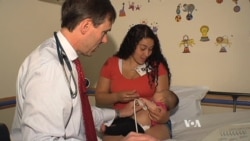Thousands of children in developing nations are born with heart problems. Thousands more develop heart disease when they are young. American Craig Sable helps some of these boys and girls. He is a pediatric cardiologist -- a doctor who treats children with heart problems. For more than 10 years, he has been traveling to Uganda to give young people in the East African nation the medical care they need.
“I think the most striking thing to me is when I walk into the waiting room and see 50 to 100 children who I know if they were here they would get fixed, and I know that we have a chance to help them.”
Dr. Sable chooses the children who need help and then works with other doctors before, during and after the treatment. In some cases, Ugandan and American doctors work together on surgical operations. Sometimes, the Ugandan doctors perform the surgery themselves, with the Americans providing support.
Dr. Sable works with medical charity groups. He has performed about 500 open-heart surgeries on Ugandan children. About 95 percent of the operations are successful. He notes that this success rate is almost as high as the rate in the United States.
“When I first went in 2002, there was no hope. Now, we’re treating about a third to a half that we see. That’s still way too few, but when you look in the children’s eyes and the parents’ eyes, you just know there’s an opportunity to make a difference."
Dr. Sable’s presence gives Ugandans hope that their children will be healed.
“He has a very large hole between the bottom two chambers of the heart, which causes extra blood to go to the lungs and makes the heart work harder and takes away productive circulation from the body.”
“I’m just pleading...it is not easy.”
“They’ll wait 10 hours, three days, take a bus for 20 hours, because they know us being there means their child can live a normal life versus die at a young age. And with that tremendous expectation, we’ve really got to do everything we can to try to close the gap and allow these kids to get the care they deserve.”
Dr. Sable performed his first open-heart surgery in Uganda in 2007. Almost all of the surgeries he performs are on children born with birth defects. They might have problems such as holes in the heart, blocked arteries or leaky valves. He partners with the Uganda Heart Institute at the Mulago National Referral Hospital in Kampala.
Dr. Sable says Uganda has what he calls a “wonderful” cardiology team. He says Uganda is one of only three African countries south of the Sahara where open-heart surgeries can be performed entirely by local doctors. The other two are Ghana and Kenya.
Twalib Aliku is a Ugandan cardiologist. He says he has learned a lot from Dr. Sable.
“He loves children. And getting these children who otherwise would not have access to lifesaving surgery, it’s a noble cause and it’s very -- from the children’s perspective it’s like someone helping you live a new life, and I think it’s been very wonderful for him to come to do that in our country. Basically, he started the program when we couldn’t do any surgeries on our own. And we’ve reached this point where we are doing many surgeries on our own as a country. It’s just tremendous what he’s done.”
Dr. Sable says he will continue to work with the Ugandan medical community to help sick children.
“My hope is they can transition from being a fledgling program that does a few heart surgeries to become a model for the region and other parts of the developing world that we can do meaningful research and innovative program implementation that other programs can copy, and they can go from being the helpers to the leaders.”
He plans to return to Uganda next month.
I’m Bob Doughty.
VOA Correspondent Mike Richman reported this story from Washington. Christopher Jones-Cruise adapted it for Learning English. George Grow was the editor.
________________________________________________________________
Words in This Story
surgery – n. a treatment in which a doctor cuts into someone’s body in order to repair or remove damaged or diseased parts (synonym for “operation”)
chamber – n. a small space inside the heart
circulation – n. the movement of blood through the body
versus – prep. against; a word used to indicate that two different things or choices are being compared or considered
artery – n. any one of the tubes or passagways that carry blood from the heart to all parts of the body
valve – n. a structure in the heart that temporarily stops the flow of fluid or that allows fluid to move in one direction only
entirely – adv. completely or fully
access – n. a way of being able to use or get something
noble – adj. relating to a good, important and worthy act
perspective – n. a way of thinking about and understanding something (such as a particular issue or life in general)
transition – v. to make a change from one place or condition to another
fledgling program – compound noun a program that is new, or getting started. (Fledgling is the gerund form of the verb “fledge,” which means it functions as a noun, and in this case it occurs as part of a compound noun. A compound noun is a noun that is made with two or more words. A compound noun is usually [noun + noun] or [adjective + noun], but there are other combinations. Each compound noun acts as a single unit and can be modified by adjectives and other nouns.)
region – n. an area that is different from other areas in some way
innovative – adj. having new ideas about how something can be done
implementation – n. the putting in place of a plan or program
Do doctors from other countries travel to your country to care for sick children? We want to hear from you. Write your thoughts in the comments section.








